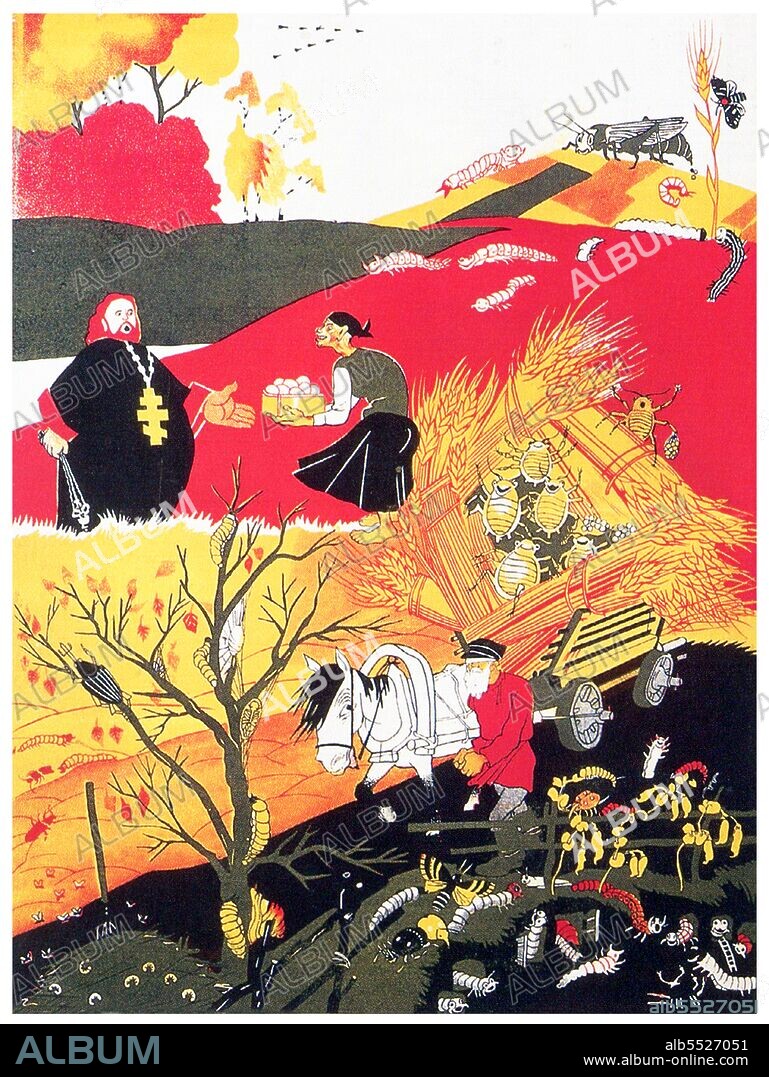alb5527051
Russia / Soviet Union: 'In autumn, the peasant harvests the crops. But he doesn't know that the fields, the forest, the garden and the orchard are infested with thieving parasites'. Anti-kulak and anti-cleric Soviet propaganda poster, Dmitry Moor,1925

|
Add to another lightbox |
|
Add to another lightbox |



Title:
Russia / Soviet Union: 'In autumn, the peasant harvests the crops. But he doesn't know that the fields, the forest, the garden and the orchard are infested with thieving parasites'. Anti-kulak and anti-cleric Soviet propaganda poster, Dmitry Moor,1925
Caption:
Kulaks were a category of relatively affluent farmers in the later Russian Empire, Soviet Russia, and early Soviet Union. The word kulak originally referred to independent farmers in the Russian Empire who emerged from the peasantry and became wealthy following the Stolypin reform, which began in 1906. The label of kulak was broadened in 1918 to include any peasant who resisted handing over their grain to detachments from Moscow. According to the political theory of Marxism–Leninism of the early 20th century, the kulaks were class enemies of the poorer peasants. Vladimir Ilyich Lenin described them as 'bloodsuckers, vampires, plunderers of the people and profiteers, who fatten on famine'. Marxism–Leninism had intended a revolution to liberate poor peasants and farm laborers alongside the proletariat. In addition, the planned economy of Soviet Bolshevism required the collectivisation of farms and land to allow industrialisation or conversion to large-scale agricultural production. In practice, government officials violently seized kulak farms and murdered resisters; others were deported to labor camps.
Credit:
Album / Pictures From History/Universal Images Group
Releases:
Model: No - Property: No
Rights questions?
Rights questions?
Image size:
3600 x 4795 px | 49.4 MB
Print size:
30.5 x 40.6 cm | 12.0 x 16.0 in (300 dpi)
Keywords:
ART • ARTS • CARTEL • COLLECTIVE FARMS • COLLECTIVES • COLLECTIVIZATION • COMMUNISM • CRIMES AGAINST HUMANITY • DEKULAKIZATION • FAMINE • GENOCIDE • HISTORIA UNIVERSAL • HISTORIA • HISTORICAL IMAGES • HISTORICAL PICTURES • HISTORICAL • HISTORY IMAGES • HISTORY PICTURES • HISTORY • KULAK • LEGEND • PLACARD • POSTER ART • POSTER • POSTERS • PROPAGANDA • RUSIA • RUSSIA • RUSSIAN • SOVIET UNION • STALIN MONUMENT • STALIN • STARVATION • STARVING TO DEATH • UCRANIA • UKRAINE • UKRAINIAN • UNION OF SOVIET SOCIALIST REPUBLICS • USSR
 Pinterest
Pinterest Twitter
Twitter Facebook
Facebook Copy link
Copy link Email
Email

